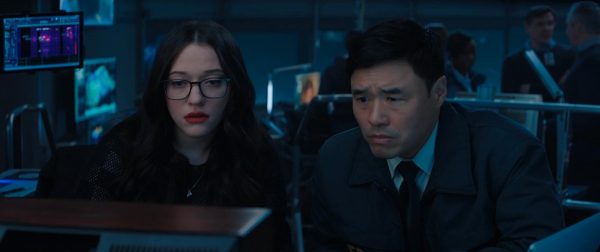As we slide into the Eighties, Marvel begins to extend its reach, lay down essential building blocks and make way for Phase Four. Florescent leg warmers, huge perms and era specific distractions cloak an intricate game of plotline poker. Slowly but surely this superficial sitcom-slash-delicate defence mechanism is crumbling away. Orchestrating from within is a person in pain, content to exist in an episodic bubble of her own making. Where WandaVision deviates into darker hues is in its intentional manipulation of bit part players to forcibly flesh out that fantasy.

Infomercials serve as franchise touchstones, informing narrative and drawing together disparate Marvel moments to encourage emotional investment. Whether they reference Stark Industries, Hydra bubble bath or Strucker timepieces everything is interlinked and indicative of Marvel as a whole. Where episode five excels most notably is in its gradual introduction of self-awareness. These meta moments are fleeting but pivotal in organically increasing dramatic potential. Paul Bettany proves invaluable at selling those revelations, drawing audiences in and yet maintaining tone through his portrayal.
Elsewhere Kat Dennings and Randall Park are proving the most watchable elements outside of the Westview anomaly. From the outside looking in both vicariously sharing, yet directly impacting on outcome, these elements require a delicate touch. For a show filled with canned laughter it is ironic that much of the comedy relies on character rather than situation. Seismic plot reveals, multiverse associations and other sizeable Easter eggs pepper this episode, yet never lack purpose or feel self-indulgent.
This is engineered by passionate people who care about story, are driven by character working towards a common goal. WandaVision taps into a universal truth shared by anyone who has ever lost a loved one. At the heart of this show is a love story centred on family, defined by loss but distorted by grief. Beyond the universe building, multiverse melding and VFX smoke screen sits some genuine pathos. Elizabeth Olsen remains the bedrock upon which Wanda’s vision rests, allowing darkness and light to exist simultaneously on screen.
At its best the show encourages reflection, addresses mortality yet cloaks it in characters which remain immortal. Our ability to move on, adapt and overcome is what makes us human. Take that away and one suspects the consequences may be catastrophic. We now stand at a crossroad where two worlds collide and one person forms the conduit between both. Capturing time in a bottle might seem like a romantic or altruistic notion, but for those blinkered by irreconcilable loss, there is nothing more self-destructive. As the wheels come off, cracks begin to show and ghosts get resurrected WandaVision may yet descend into a multiverse of madness.



